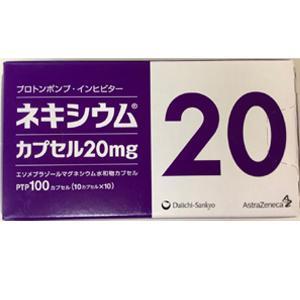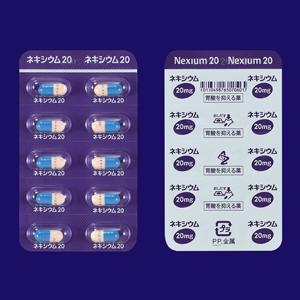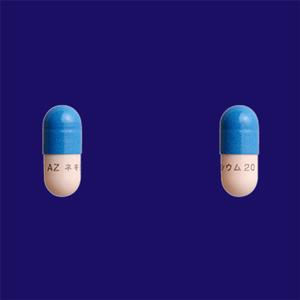- :
- Unit Price:
- Quantity:




Original
-
Code:006476-002
Original
- Nexium Capsules 20 : 100 capsuls
- $256.00
Up to 2 pieces per person
10% discount for total amount over $100
shipping schedule : 5 to 10 working days after payment
warehouse:Japan1
Manufacturer :AstraZeneca
Brand :Astra Zeneca
JAN Code:----
-
Description
-
This medicine acts on a terminal step in gastric acid secretion, called proton-pump, and inhibits gastric acid secretion. It consequently increases pH in the stomach and enhances antimicrobial actions of antibacterial agents.
It is usually used to treat gastric/duodenal/anastomotic ulcer, reflux esophagitis, Zollinger-Ellison syndrome, and for suppression of recurrence of gastric/duodenal ulcer associated with nonsteroidal anti-inflammatory drug or low-dose aspirin medication. Also, this medicine is used to help the eradication of Helicobacter pylori in the stomach in gastric/duodenal ulcer, gastric MALT lymphoma, idiopathic thrombocytopenic purpura, after endoscopic therapy for early gastric cancer and Helicobacter pylori gastritis together with 2 other antibacterial agents.
-
Presentation
-
100 capsuls
-
Feature
-
deep blue/slight yellow-red capsule, major axis: 11.40 mm, minor axis: 4.90 mm
-
Active Ingredients
-
Esomeprazole magnesium hydrate
-
Effect/Efficacy
-
This medicine acts on a terminal step in gastric acid secretion, called proton-pump, and inhibits gastric acid secretion. It consequently increases pH in the stomach and enhances antimicrobial actions of antibacterial agents.
It is usually used to treat gastric/duodenal/anastomotic ulcer, reflux esophagitis, Zollinger-Ellison syndrome, and for suppression of recurrence of gastric/duodenal ulcer associated with nonsteroidal anti-inflammatory drug or low-dose aspirin medication. Also, this medicine is used to help the eradication of Helicobacter pylori in the stomach in gastric/duodenal ulcer, gastric MALT lymphoma, idiopathic thrombocytopenic purpura, after endoscopic therapy for early gastric cancer and Helicobacter pylori gastritis together with 2 other antibacterial agents.
-
Usage/Dosage
-
To treat gastric/duodenal/anastomotic ulcer or Zollinger-Ellison syndrome: In general, for adults, take 1 capsule (20 mg of esomeprazole) at a time, once a day. The usual duration of administration is up to 8 weeks for gastric/anastomotic ulcer , and up to 6 weeks for duodenal ulcer.
In general, for children whose body weight is 20 kg or over, take 10 to 20 mg of esomeprazole at a time, once a day, according to the symptoms. The usual duration of administration is up to 8 weeks for gastric/ anastomotic ulcer, and up to 6 weeks for duodenal ulcer.
To treat reflux esophagitis: In general, for adults, take 1 capsule (20 mg of esomeprazole) at a time, once a day. The usual duration of administration is up to 8 weeks. For maintenance therapy of repeatedly recurrent/relapsing reflux esophagitis, take 10 to 20 mg of esomeprazole at a time, once a day.
In general, for children whose body weight is 20 kg or over, take 10 to 20 mg of esomeprazole at a time, once a day, according to the symptoms. The usual duration of administration is up to 8 weeks.
For suppression of recurrence of gastric/duodenal ulcer associated with nonsteroidal anti-inflammatory drug or low-dose aspirin medication: In general, for adults, take 1 capsule (20 mg of esomeprazole) at a time, once a day.
To help the eradication of Helicobacter pylori: In general, for adults, take 1 capsule (20 mg of esomeprazole) concomitantly with 750 mg of amoxicillin hydrate (titer) and 200 to 400 mg of clarithromycin (titer) at a time, twice a day, for 7 days.
If this is insufficient, as an alternative, take 1 capsule (20 mg of esomeprazole) concomitantly with 750 mg of amoxicillin hydrate (titer) and 250 mg of metronidazole at a time, twice a day, for 7 days.
This preparation contains 20 mg of esomeprazole in a capsule.
In any case, strictly follow the instructions.
If you miss a dose, take the missed dose as soon as possible. However, if it is almost time for the next dose, skip the missed dose and follow your regular dosing schedule. You should never take two doses at one time.
If you accidentally take more than your prescribed dose, consult with your doctor or pharmacist.
Do not stop taking this medicine unless your doctor instructs you to do so.
-
Cautions
-
If you have previously experienced any allergic reactions (itch, rash, etc.) to any medicines.
If you have liver disorder.
If you are pregnant or breastfeeding.
If you are taking any other medicinal products. (Some medicines may interact to enhance or diminish medicinal effects. Beware of over-the-counter medicines and dietary supplements as well as other prescription medicines.)
Pay attention when taking any food containing St. John's wort, since it may diminish medicinal effects.
Keep out of reach of children. Store away from direct sunlight, heat and moisture
Discard the remainder. Do not store them.
-
Contraindication
-
The most commonly reported adverse reactions include diarrhea, abnormal hepatic function, erosive gastritis, abdominal distension, gastric polyps, anemia, abdominal pain, photosensitivity reaction, rash, loose stool and taste abnormality. If any of these symptoms occur, consult with your doctor or pharmacist.
The symptoms described below are rarely seen as initial symptoms of the adverse reactions indicated in brackets. If any of these symptoms occur, stop taking this medicine and see your doctor immediately.
respiratory distress, hives, facial/lips/tongue swelling [shock, anaphylaxis]
general malaise, fever, nose/subcutaneous bleeding [pancytopenia, agranulocytosis, decreased platelets]
nausea/vomiting, loss of appetite, yellowing of the skin and the white of eyes [fulminant hepatitis, liver dysfunction, jaundice, hepatic failure]
fever, general malaise, rash/redness on the skin/eyes and in the mouth [toxic epidermal necrolysis, muco-cutaneo-ocular syndrome]
fever, cough, shortness of breath [interstitial pneumonia]
fever, rash, joint pain [interstitial nephritis]
muscle pain of limbs, rigidity, numbness, red-brown urine [rhabdomyolysis]
nausea/vomiting, convulsion, headache, consciousness disorder [hyponatraemia]
confused consciousness and unable to have normal thoughts, impaired mind, hallucination [confusional state]
The above symptoms do not describe all the adverse reactions to this medicine. Consult with your doctor or pharmacist if you notice any symptoms of concern other than those listed above.